|
|
|
Sort Order |
|
|
|
Items / Page
|
|
|
|
|
|
|
| Srl | Item |
| 1 |
ID:
141515
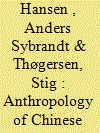

|
|
|
|
|
| Summary/Abstract |
The contemporary world is experiencing massive transnational population movements under the banner of higher education. This is in no small part due to the People’s Republic of China (PRC). Beginning in the late 1970s, PRC policies have actively encouraged young Chinese to go abroad to study as part of their higher education. Since then, the state has increasingly relinquished control over educational migration, turning instead to creating incentives for academic “talents” in key fields to either return to China or serve Chinese interests while living abroad (Liu 2014; Xiang and Shen 2009; Zweig, Fung, and Han 2008). Concurrent with this political relaxation, average Chinese incomes have risen dramatically, and higher education has grown gradually more integrated at a global level. The result has been remarkable. For some years now, China has been the largest global source of transnational students.
|
|
|
|
|
|
|
|
|
|
|
|
|
|
|
|
| 2 |
ID:
125125
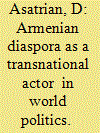

|
|
|
|
|
| Publication |
2013.
|
| Summary/Abstract |
IT IS CUSTOMARY to recognize sovereign states and the interstate organizations established on their basis as the leading actors in the political system of the contemporary world. Such theoretical schools as realism and, with some differences, constructivism support this approach.
|
|
|
|
|
|
|
|
|
|
|
|
|
|
|
|
| 3 |
ID:
125031
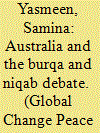

|
|
|
|
|
| Publication |
2013.
|
| Summary/Abstract |
This paper locates the discussion on wearing niqab and burqa within the context of information acquisition and response formation among Muslims and non-Muslims in the contemporary world. The paper argues that, against the backdrop of varied opinions on Islam and Muslims around the world, the debate on wearing burqa represents the continuation - albeit up-scaling - of the focus on Muslim women as the signifiers of Islam and Muslim identities. Australia is influenced by, and dealing with, the debate on whether or not to ban the burqa and niqab. Opinions among both the wider community and Muslims have differed on the justification and advisability of such a ban. The Australian government at the federal and state levels has demonstrated cautious activism in dealing with the issue, thus protecting the rights of Australian Muslim minorities, and reducing the space in which a heightened sense of exclusion could develop among them.
|
|
|
|
|
|
|
|
|
|
|
|
|
|
|
|
| 4 |
ID:
102159
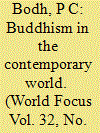

|
|
|
| 5 |
ID:
131416
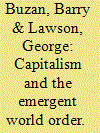

|
|
|
|
|
| Publication |
2014.
|
| Summary/Abstract |
The two-centuries-old hegemony of the West is coming to an end. The 'revolutions of modernity' that fuelled the rise of the West are now accessible to all states. As a consequence, the power gap that developed during the nineteenth century and which served as the foundation for a core-periphery international order is closing. The result is a shift from a world of 'centred globalism' to one of 'decentred globalism'. At the same time, as power is becoming more diffuse, the degree of ideological difference among the leading powers is shrinking. Indeed, because all Great Powers in the contemporary world are in some form capitalist, the ideological bandwidth of the emerging international order is narrower than it has been for a century. The question is whether this relative ideological homogeneity will generate geo-economic or geopolitical competition among the four main modes of capitalist governance: liberal democratic, social democratic, competitive authoritarian and state bureaucratic. This article assesses the strengths and weaknesses of these four modes of capitalist governance, and probes the main contours of inter-capitalist competition. Will the political differences between democratic and authoritarian capitalists override their shared interests or be mediated by them? Will there be conflicting capitalisms as there were in the early part of the twentieth century? Or will the contemporary world see the development of some kind of concert of capitalist powers? A world of politically differentiated capitalisms is likely to be with us for some time. As such, a central task facing policy-makers is to ensure that geo-economic competition takes place without generating geopolitical conflict.
|
|
|
|
|
|
|
|
|
|
|
|
|
|
|
|
| 6 |
ID:
131417
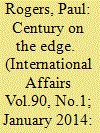

|
|
|
|
|
| Publication |
2014.
|
| Summary/Abstract |
The article argues that the century from 1945 is likely to prove seminal in terms of human progress. It marks the period when the human community has to come to terms with its capacity for self-destruction through the invention of weapons of mass destruction and its ability to exceed the homeostatic capabilities of the global ecosystem in an era of deep socio-economic divisions. Two-thirds of the way through this century the progress has been mixed. Nuclear war has been avoided more by luck than by wisdom, there remain risks of nuclear proliferation and it is not evident that humankind has acquired the ability to deal with the destructive potential of bio-, nano- and other emerging technologies. Recognition of the extent of anthropogenic impacts on ecosystem stability is evident, but not at the level necessary for the radical responses required. Even so, there are signs of progress and potential for change, suggesting that the final one-third of the century will be singularly important in ensuring long-term emancipation and environmental sustainability.
|
|
|
|
|
|
|
|
|
|
|
|
|
|
|
|
| 7 |
ID:
086352
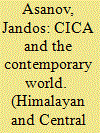

|
|
|
|
|
| Publication |
2008.
|
| Summary/Abstract |
In the fast changing world of 21st century, Asia occupies a unique place. It has been showing a remarkable economic growth over the last few years. Thereafter, 21st century is being described as the Asian century. With its rising military, economic and political clout, Asia is playing an increasingly important role in the world community.
|
|
|
|
|
|
|
|
|
|
|
|
|
|
|
|
| 8 |
ID:
129541
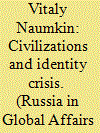

|
|
|
|
|
| Publication |
2014.
|
| Summary/Abstract |
One would think that proponents of the Eurasian choice would seek to build bridges between Russia and the Islamic world, but they often manifest biased attitudes towards the Muslim civilization as such. In the light of developments in the contemporary world, the subject of "civilizations" is becoming ever more popular and interesting both for authors - researchers and commentators - and readers. The issues of cultural/civilizational identity, the nature of relationships between values ??of different regional/cultural clusters, and vectors of nation states' evolution amid an increasing hyper-globalization are becoming increasingly relevant and require a fundamental theoretical rethinking.
|
|
|
|
|
|
|
|
|
|
|
|
|
|
|
|
| 9 |
ID:
131790
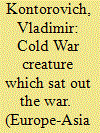

|
|
|
|
|
| Publication |
2014.
|
| Summary/Abstract |
A substantial body of literature argues that government funding motivated by the Cold War shaped (or distorted) the content of the American academic disciplines. This article tests the impact of such funding on the academic study of the Soviet economy, a small field created to help fight the Cold War. It documents the amount of attention given by researchers to the military sector of the Soviet economy, the topic of central importance for the Cold War, and finds that their publications largely ignored it. Considerations other than the interests of the sponsors determined the choice of topics in the discipline.
|
|
|
|
|
|
|
|
|
|
|
|
|
|
|
|
| 10 |
ID:
148719
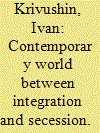

|
|
|
|
|
| Summary/Abstract |
The article discusses two major trends in contemporary world politics—the disintegration of the nation-state and supranational integration—and analyses their nature, causes and significance. The author concludes that these processes have a different character within and outside Europe and that the multidirectional trends in different parts of the world, on the one hand, complicate Russia’s foreign policy-making and implementation, but, on the other, widen Russia’s room for diplomatic manoeuvring and increase the opportunities to exploit the contradictions between old and new actors in international relations.
|
|
|
|
|
|
|
|
|
|
|
|
|
|
|
|
| 11 |
ID:
145909
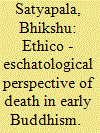

|
|
|
|
|
| Summary/Abstract |
The title of this paper as it suggests, mainly aims to deal with an important issue of human life i.e., death which has been in the focus from the centuries in philosophical circles though it is still an unresolved mystery obfuscating the human mind. The famous scripture Bhagavadgðta thus runs untiringly, “just as an embodied soul attains childhood, youth and old age through the body, so it attains another body after death. This Self is never born, nor dies ......”. This view of death subsumes the existence of the soul firstly and eternality of the same secondly. However, all religions of the world barring a few like Buddhism, do not describe the death as a horrified and unpleasant dagger hung over the humanity, rather they interpret death as an inevitable phenomenon that does not disturb a being’s existence. Accordingly different theories sneaked through the ever - long and endless speculations over the centuries, but to no avail. Regardless of it the misery of death continues its sway over humanity.
|
|
|
|
|
|
|
|
|
|
|
|
|
|
|
|
| 12 |
ID:
145919
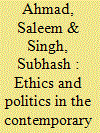

|
|
|
|
|
| Summary/Abstract |
Almost thirteen years after the invasion of Iraq, it teaches several ethical lessons about war as an instrument of the US foreign policy. First, and foremost, the Iraq war reminds us of the folly and immorality of pre-emptive war. The Bush administration attempted to exercise its “entitlement to meddle…to demonstrate its capacity to impose its will on its designated adversaries” by invading Iraq. President Bush’s efforts to exercise his “entitlement to meddle” backfired when it gave birth to an intractable insurgency against the American occupation forces and an ongoing civil war in Iraq. Second, the Iraq war offers an object lesson on the limits of imperial might.
|
|
|
|
|
|
|
|
|
|
|
|
|
|
|
|
| 13 |
ID:
145907
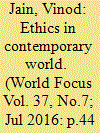

|
|
|
|
|
| Summary/Abstract |
Ethics took shape in two different ways. One, in ancient times, when humans in order to understand environment started asking questions and kept trying to answer them by arguments and conjecture. This took them to what we now know as the religious path. In those earlier times religion suggested how human society began. At that time laws governing human behaviour were made in the name of God. At that time the concept of morality also went in the name of God. Two, in recent times, that is, during the last few hundred years, development of science based knowledge in a vast variety of fields developed a scientific world view. This world view was not based on opinions based on limited knowledge. This was based on knowledge that was huge, was verifiable and was expanding.
|
|
|
|
|
|
|
|
|
|
|
|
|
|
|
|
| 14 |
ID:
145890
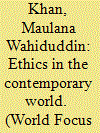

|
|
|
|
|
| Summary/Abstract |
According to my study, all the religions have two different aspects to them – theology and the moral scheme. Theology means the set of beliefs or doctrinal base of a religion, in other words, the inner contents of a religion. In terms of theology, there are differences between religions. For example, some religions have the monistic concept of God, while other religions believe in the monotheistic concept of God. Differences of this kind have always been the subject of discussion among theologians and no doubt, they will continue to be so in the future. But like other intellectual discussions about differences, they are basically confined to scholars, having nothing to do with the common people. Common people can live their daily lives without concerning themselves with or even without knowing about these issues. These issues are concern of a few individuals and not of the masses of any society.
|
|
|
|
|
|
|
|
|
|
|
|
|
|
|
|
| 15 |
ID:
145895
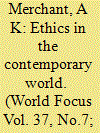

|
|
|
|
|
| Summary/Abstract |
Looking at the world conditions in the age of globalization the author provides powerful insights into the causes of a near bankruptcy of ethics and morality both in private dealings and the public spaces. He draws great inspiration from the Teachings of Bahá’u’lláh, founder of the Bahá'í Faith, in providing the remedial measures that are pertinent and sorely needed for recovery of our civilizational ethos. Although the nations of the world are committed to upholding the United Nations Convention against Corruption adopted in 2003 yet the ground reality is just the opposite. With every passing day the complexity of world situation is becoming more and more difficult to fathom. In different nations in different ways, the social consensus around ideals that have traditionally united and bound together the society appears to be worn and spent. One explanation offered is that religion or dharma which provided the foundational framework for ethics and morality both in private and public life have grossly eroded in today’s world. Restoration of the powerful motivating force of dharma or religion would infuse every sincere follower with the highest ethical precepts for the betterment of societies and lasting peace in the world, the article persuasively advocates.
|
|
|
|
|
|
|
|
|
|
|
|
|
|
|
|
| 16 |
ID:
112819
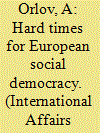

|
|
|
|
|
| Publication |
2012.
|
| Summary/Abstract |
THE 20TH CENTURY is commonly believed to be the golden age of Social Democracy even though the number of enthusiastic supporters is balanced out by the number of no less enthusiastic opponents of this idea. It is obvious, however, that the ideology and its vehicle - the socialist and social democratic parties - have figured prominently on the ideological and political scene of the contemporary world.
|
|
|
|
|
|
|
|
|
|
|
|
|
|
|
|
| 17 |
ID:
131420
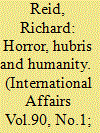

|
|
|
|
|
| Publication |
2014.
|
| Summary/Abstract |
This article examines the international engagement with Africa from the First World War and the apex of colonial rule through to the present day. It is argued that there have been dramatic shifts throughout this period-from increasing interventionism on the part of the colonial state, to decolonization and the emergence of nation-states with independent foreign policy programmes, to the predations and influences of the Cold War, to the developmentalism and humanitarianism of the contemporary era. Yet, there has also been marked continuity in terms of policy, perception and practice. In particular, Africa has long been seen in terms of economic opportunity-a place where markets and raw materials abound-and of military and political threat, a place in which intrinsic instability makes external intervention both desirable and inevitable. While immediate contexts have changed over time, the international engagement with the continent remains essentially economic and military. A concern for democratization and development represents a relatively new element, although even this can be traced to the paternalistic humanitarianism of the colonial era and, earlier still, moral stances toward Africa in the nineteenth century.
|
|
|
|
|
|
|
|
|
|
|
|
|
|
|
|
| 18 |
ID:
145891
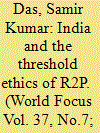

|
|
|
|
|
| Summary/Abstract |
India’s foreign policy in the post-Cold War period has become a subject of one of the most acrimonious debates in her recent past history. While it is often denigrated as ‘firefighting’, ‘ad hocism’ and ‘drift’, many other commentators propose to interpret it as one driven by realpolitik interests paying scant regard to her ideological and ethical commitments. Never before in her history has Indian foreign policy faced such an ethical crisis as it is facing now.
|
|
|
|
|
|
|
|
|
|
|
|
|
|
|
|
| 19 |
ID:
183387
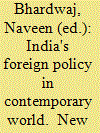

|
|
|
|
|
| Publication |
New Delhi, Regal Publications, 2014.
|
| Description |
xxxiii, 276p.hbk
|
| Standard Number |
9788184843651
|
|
|
|
|
|
|
|
|
|
|
|
Copies: C:1/I:0,R:0,Q:0
Circulation
| Accession# | Call# | Current Location | Status | Policy | Location |
| 060137 | 327.54/BHA 060137 | Main | On Shelf | General | |
|
|
|
|
| 20 |
ID:
145910
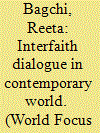

|
|
|
|
|
| Summary/Abstract |
On entering into a new millennium it is realized that the world we live in and the world that the coming generation will inherit are challenging and different from the past. Rapid advancement in the area of Science and technology has transformed society by transcending narrow grooves of thought. Advancement in transport system, information and communication technology has witnessed unprecedented activity on trade and economic front breaking all barriers between countries. The whole world has turned to a small village and global community of aspirations and endeavors resulting in the evolution of a universal culture and civilization which has brought diverse religious and cultural groups together in every country.
|
|
|
|
|
|
|
|
|
|
|
|
|
|
|
|
|
|
|
|
|